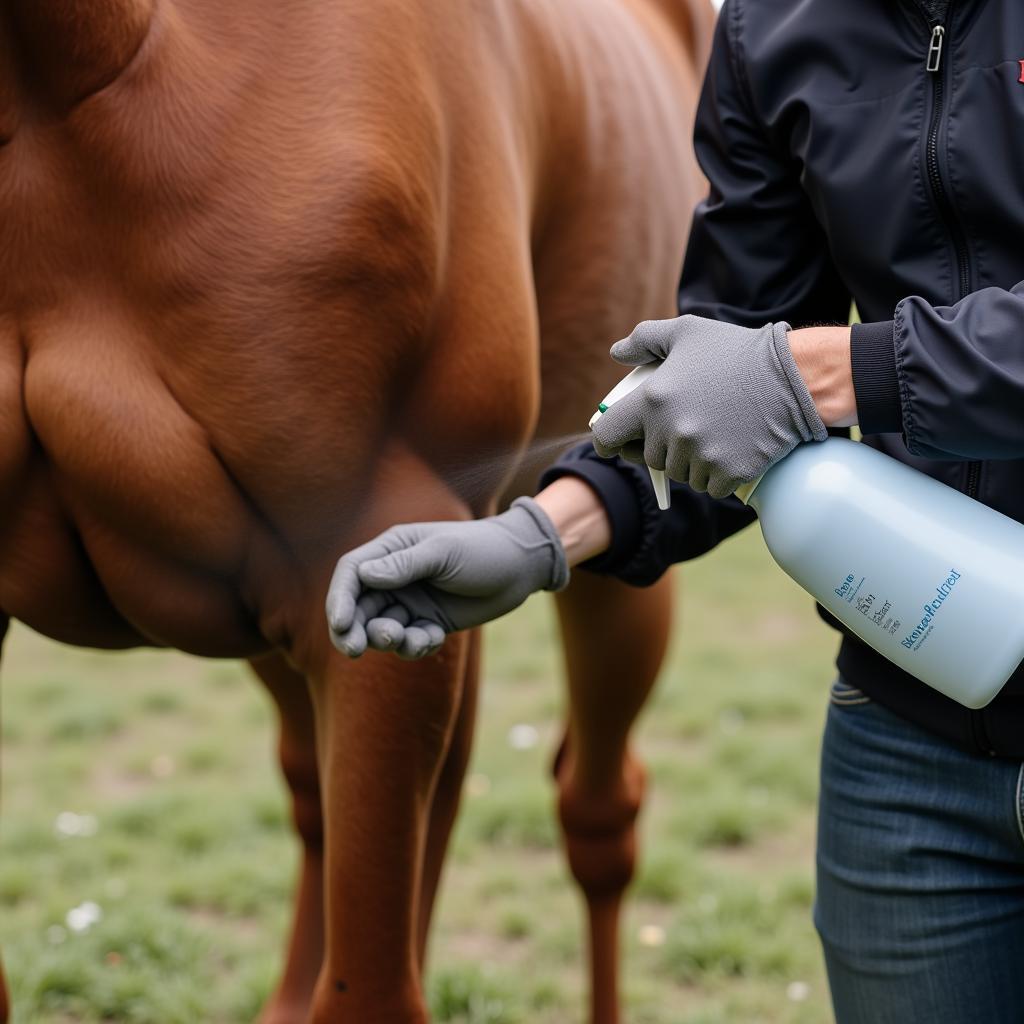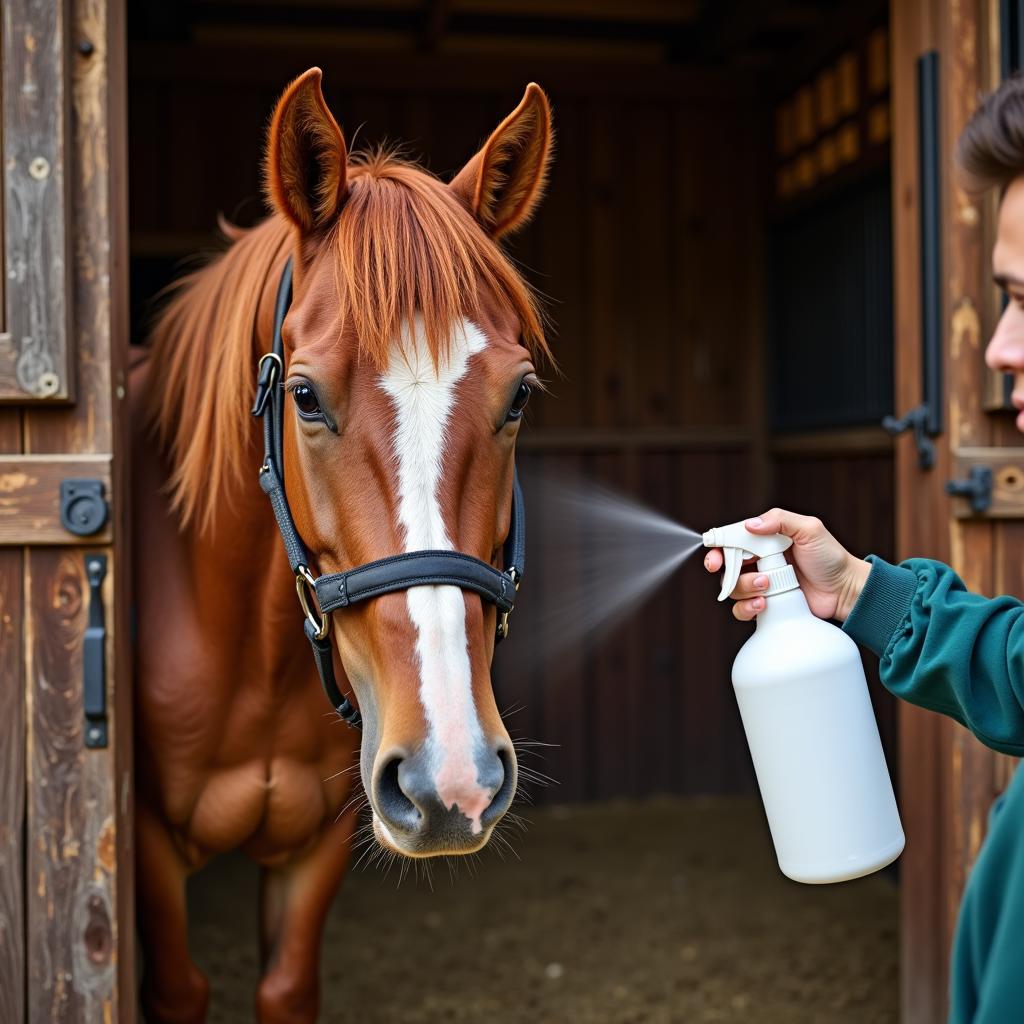Tick spray for horses is an essential part of equine care, especially during warmer months. Ticks can transmit serious diseases, making effective tick control crucial for maintaining your horse’s health and well-being. Choosing the right tick spray and applying it correctly are key steps in safeguarding your horse from these parasites. Let’s delve into the world of tick sprays and equip you with the knowledge to keep your horse tick-free.
Understanding the Need for Tick Spray for Horses
Ticks aren’t just a nuisance; they’re a serious threat to your horse’s health. These tiny parasites can carry a range of diseases, including Lyme disease, anaplasmosis, and piroplasmosis, which can cause debilitating symptoms and even be fatal. Regularly using tick spray for horses is a proactive measure to prevent these diseases and protect your equine companion. This isn’t just about comfort; it’s about health. What are the best ways to keep ticks off horses?
You can explore different methods for tick control in our guide on how to keep ticks off horses.
 Horse Being Sprayed with Tick Repellent
Horse Being Sprayed with Tick Repellent
Choosing the Right Tick Spray for Horses
With a plethora of tick sprays available, selecting the right one can be overwhelming. Consider your horse’s individual needs, including sensitivity to certain ingredients. Look for sprays specifically formulated for horses, as products designed for other animals may contain harmful chemicals. Pyrethrin and permethrin-based sprays are common choices, but always consult with your veterinarian to determine the safest and most effective option for your horse. Do you prefer natural solutions?
For horse owners seeking natural alternatives, our guide on natural bug spray for horses offers valuable insights.
Applying Tick Spray Correctly
Proper application is crucial for maximizing the effectiveness of tick spray. Follow the manufacturer’s instructions carefully, paying attention to recommended dosages and application frequency. Apply the spray evenly to all areas of your horse’s body, including the legs, belly, and mane. Be mindful of sensitive areas like the eyes and nose.
 Applying Tick Spray to a Horse
Applying Tick Spray to a Horse
Remember to wear gloves when applying tick spray to protect your own skin. Thorough and consistent application is key to keeping ticks at bay. When combined with other preventative measures, tick spray becomes an even more powerful tool in your arsenal against these parasites.
Beyond Tick Spray: A Holistic Approach to Tick Control
While tick spray is a crucial element of tick control, it’s most effective when combined with other strategies. Regularly grooming your horse, checking for ticks, and maintaining a clean pasture can significantly reduce tick populations. Consider rotating pastures and mowing tall grass to create an environment less hospitable to ticks.
“Integrated pest management is essential for effective tick control,” says Dr. Emily Carter, DVM, specializing in equine medicine. “Combining tick spray with environmental management practices creates a comprehensive defense against these parasites.”
Tick Spray Horses: FAQs
1. How often should I apply tick spray to my horse? The frequency of application depends on the specific product and the level of tick infestation in your area. Consult your veterinarian or follow the product label instructions.
2. Are there natural alternatives to chemical tick sprays? Yes, several natural tick repellents are available, including essential oil-based sprays. Check out our guide on oils for horses for more information.
3. Can I use dog tick spray on my horse? No, never use dog tick spray on a horse. Products formulated for dogs may contain ingredients toxic to horses.
4. What should I do if my horse has a tick embedded in its skin? Carefully remove the tick using tweezers, ensuring you grasp it close to the skin’s surface. Consult your veterinarian if you have any concerns.
5. Can ticks transmit diseases to humans? Yes, ticks can transmit several diseases to humans, including Lyme disease and Rocky Mountain spotted fever. Take precautions to protect yourself when handling horses in tick-infested areas.
6. How can I prevent ice balls from forming on my horse’s feet, which can make them more susceptible to tick bites? Explore our article on how to prevent ice balls in horses feet for effective strategies.
7. Can I make my own tick spray for horses? While homemade remedies exist, it’s crucial to ensure they are safe and effective for horses. Consult with your veterinarian before using any homemade tick spray.
Conclusion
Protecting your horse from ticks is a vital aspect of responsible horse ownership. Tick spray for horses, when used correctly and in conjunction with other preventative measures, provides a robust defense against these disease-carrying parasites. By understanding the importance of tick control and implementing a comprehensive approach, you can ensure your horse stays healthy and tick-free. Remember, early prevention is key!
You can find additional tips on repelling mosquitos in our guide on homemade mosquito spray for horses.
Need more information? Contact us! Phone: 0772127271, Email: [email protected] or visit us at QGM2+WX2, Vị Trung, Vị Thuỷ, Hậu Giang, Việt Nam. Our customer service team is available 24/7.